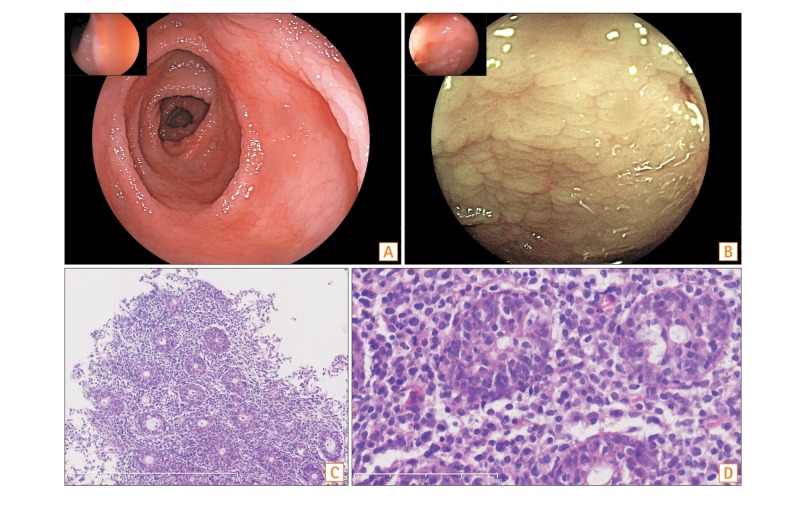

Question: A 64-year-old man presented with chronic watery diarrhea and weight loss for 5 months prior to hospitalization. He had 8 to 15 bowel movements per day, with a total volume of 2 L. He had been in poor health for more than 30 years, mainly due to recurrent herpes zoster ophthalmicus, sinusitis, and upper respiratory tract infections. Physical examination was unremarkable except for a malnourished state with BMI of 14.8 kg/m2. Laboratory tests indicated low IgG and IgM levels (IgG, 372 mg/dL; IgM 21, mg/dL), and negative tissue transglutaminase and endomysial antibodies. Colonoscopy showed edematous but otherwise normal mucosa (Fig. A, white light) with mosaic-like pattern (Fig. B). Fluorodeoxyglucose-PET showed diffuse, intense radioactivity in the colon and rectum with standardized uptake value 2.6 to 5.1. Biopsy specimens were taken from the sigmoid and rectum. What is your diagnosis of this patient?
Biopsies revealed diffuse infiltration of monotonous, small-to-intermediate lymphocytes, with round or slightly irregular nuclei (Fig. C, ×100 and Fig. D, ×400; H&E). These atypical cells were immunochemically positive for CD3, CD7, CD8, and CD56, and negative for CD5 and EBV-encoded RNA, with a high Ki-67 index of 80%. The diagnosis of monomorphic epitheliotropic intestinal T-cell lymphoma (MEITL) was confirmed. Based on recurrent infection episodes for 30 years and hypoglobulinemia (IgG and IgM), common variable immunodeficiency (CVID) was clinically diagnosed. The patient refused chemotherapy and died 3 months later.
MEITL, or enteropathy-associated T-cell lymphoma, type II is a rare peripheral T-cell lymphoma commonly found in the small intestine. Endoscopic findings may include nodules, masses, strictures, and ulcers.1 Meanwhile, CVID is the most common primary immunodeficiency in adults, and gastrointestinal symptoms are commonly observed in CVID.23 Endoscopic findings depend on the underlying cause of the symptoms and are thus variable. In the long-term, patients with CVID are at higher risk of developing malignancies, especially non-Hodgkin's lymphoma.4 In the case of our patient, colonoscopy showed almost normal mucosa, which is unusual in MEITL, but fairly common in CVID. Therefore, biopsies should be performed even in the absence of obvious lesions. To our knowledge, this is the first reported case of CVID developing into MEITL.
Notes
AUTHOR CONTRIBUTION: Y.L., collecting materials, drafting the manuscript; Y.H.N., collecting materials; J.L., design, drafting the manuscript; J.M.Q., design, drafting the manuscript; W.X.Z., reviewing the pathologic findings of the biopsies; Y.L., interpreting the radiological results.
References
1. Ondrejka S, Jagadeesh D. Enteropathy-associated T-cell lymphoma. Curr Hematol Malig Rep. 2016; 11:504–513. PMID: 27900603.

2. Jørgensen SF, Reims HM, Frydenlund D, et al. A Cross-sectional study of the prevalence of gastrointestinal symptoms and pathology in patients with common variable immunodeficiency. Am J Gastroenterol. 2016; 111:1467–1475. PMID: 27527747.

3. Khodadad A, Aghamohammadi A, Parvaneh N, et al. Gastrointestinal manifestations in patients with common variable immunodeficiency. Dig Dis Sci. 2007; 52:2977–2983. PMID: 17431775.
4. Park MA, Li JT, Hagan JB, Maddox DE, Abraham RS. Common variable immunodeficiency: a new look at an old disease. Lancet. 2008; 372:489–502. PMID: 18692715.




 PDF
PDF ePub
ePub Citation
Citation Print
Print


 XML Download
XML Download